状语从句语法及习题
- 格式:doc
- 大小:52.00 KB
- 文档页数:7
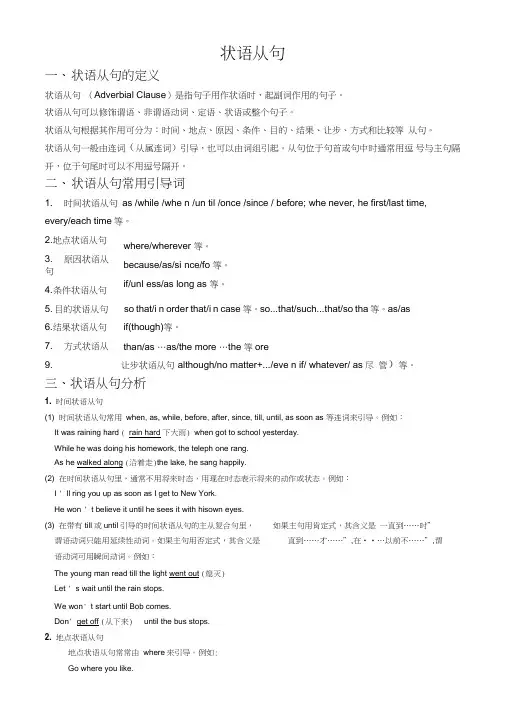
状语从句一、状语从句的定义状语从句(Adverbial Clause)是指句子用作状语时,起副词作用的句子。
状语从句可以修饰谓语、非谓语动词、定语、状语或整个句子。
状语从句根据其作用可分为:时间、地点、原因、条件、目的、结果、让步、方式和比较等从句。
状语从句一般由连词(从属连词)引导,也可以由词组引起。
从句位于句首或句中时通常用逗号与主句隔开,位于句尾时可以不用逗号隔开。
二、状语从句常用引导词1. 时间状语从句as /while /whe n /un til /once /since / before; whe never, he first/last time,every/each time等。
2. 地点状语从句3. 原因状语从句4. 条件状语从句5. 目的状语从句6. 结果状语从句7. 方式状语从句where/wherever 等。
because/as/si nce/fo 等。
if/unl ess/as long as 等。
so that/i n order that/i n case等。
so...that/such...that/so tha等。
as/as if(though)等。
than/as …as/the more …the 等ore9. 让步状语从句although/no matter+.../eve n if/ whatever/ as尽管)等。
三、状语从句分析1. 时间状语从句(1) 时间状语从句常用when, as, while, before, after, since, till, until, as soon as 等连词来引导。
例如:It was raining hard ( rain hard 下大雨) when got to school yesterday.While he was doing his homework, the teleph one rang.As he walked along (沿着走)the lake, he sang happily.(2) 在时间状语从句里,通常不用将来时态,用现在时态表示将来的动作或状态。
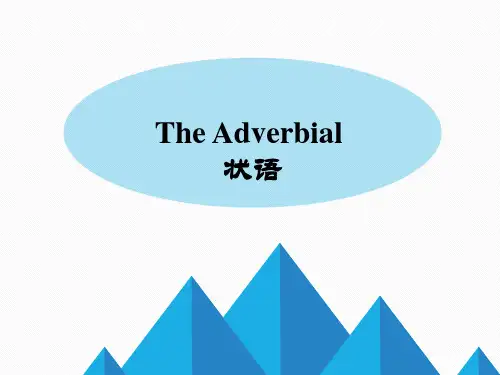
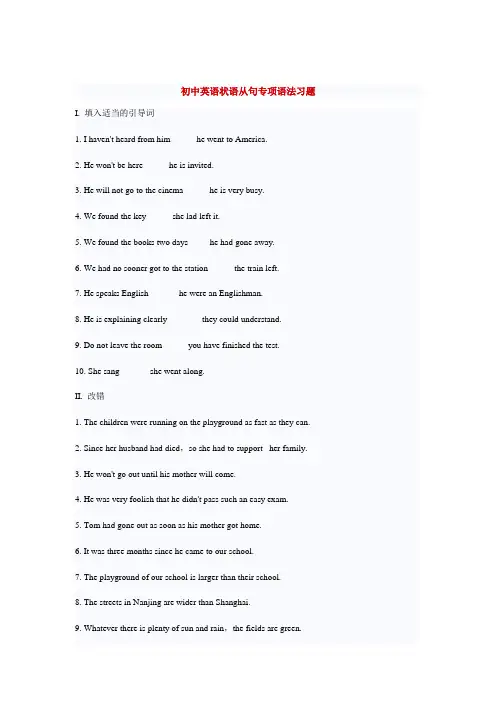
初中英语状语从句专项语法习题I. 填入适当的引导词1. I haven't heard from him _____ he went to America.2. He won't be here _____ he is invited.3. He will not go to the cinema _____ he is very busy.4. We found the key _____ she lad left it.5. We found the books two days ____ he had gone away.6. We had no sooner got to the station _____ the train left.7. He speaks English ______ he were an Englishman.8. He is explaining clearly _______ they could understand.9. Do not leave the room _____ you have finished the test.10. She sang ______ she went along.II. 改错1. The children were running on the playground as fast as they can.2. Since her husband had died,so she had to support her family.3. He won't go out until his mother will come.4. He was very foolish that he didn't pass such an easy exam.5. Tom had gone out as soon as his mother got home.6. It was three months since he came to our school.7. The playground of our school is larger than their school.8. The streets in Nanjing are wider than Shanghai.9. Whatever there is plenty of sun and rain,the fields are green.10. She sings songs as if she is a bird.III. 找出从句并指出是那类从句1. It depends on whether we have enough time.2. The question he asked was where the electrical equipment should be stored.3. The mountain is no longer what it used to be.4. The fact that she works hard is well known to us all.5. He was not the man that he was before.6. Now you was free,why not go swimming with us?7. Where there are schools and colleges,there are examinations.8. Bad habits,once firmed,are difficult to give up.9. She often wears the same kind of skirt as her twin sister does.10. The moment he opened the window,a bird flew in.IV. 填入适当的引导词完成句子1. ____ will do the experiment comes to the professor's office.2. ___ will do the experiment hasn't been decided.3. The teacher didn't leave ______ twelve o'clock.4. ______ the day went on,the weather got worse.5. _____ she is young,she knows quite a lot.6. It worried her a bit ____ her hair was turning grey.7. You will be late ____ you leave immediately.8. Go and get your coat. It's ______ you left it.9. ______ is mentioned above,the number of the students in senior high schools is increasing.10. ____ had I entered the room ____ the phone rang.V. 改错1. Is this the watch for which he is looking now?2. This is all which I can do for you.3. Do you know the old man at the back of the room,whom has been chosen head of the factory.4. I want to know the way which you learn new words.5. Can you tell me that there's a bookstore near here?6. Our school quite different from that it was before.7. If she likes the present is not clear to me.8. For she is ill,she hasn't come to school.9. It gave him so a big shock that his face turned pale.10. He is cleverer than any boy in his class.--------------------------------------------------------------------------------参考答案:I、1. since2. unless3. because4. where5. after6. than7. as if8. so that 9. before10. asII、1. can 改为could 2. 去掉so 3. will come改为comes 4. very改为so 5. as soon as 改为when 6. was 改为is 7. than 之后加上that of 8. than 后加those in 9. whatever改为wherever 10. is改为wereIII、1. whether we have enough time 介词宾语从句2. he asked 定语从句where the electrical equipment should be stored表语从句3. what it used to be 表语从句4. that she works hard 同位语从句5. that he was before 定语从句6. Now you was free 让步状语从句now= now that7. Where there are schools and colleges 地点状语从句8. once firmed 时间状语从句9. as her twin sister does 定语从句10. The moment he opened the window 时间状语从句IV、1. Whoever 2. Who 3. until 4. As 5. Although 6. that 7. unless 8. where 9. As 10. Hardly,when (No sooner,than )V、1. for 放在looking 之后 2. which 改为that 3. whom 改为who 4. which改为how 5. that改为whether 6. that 改为what 7. If改为Whether 8. For改为Because 9. so改为such 10.any 后加other。
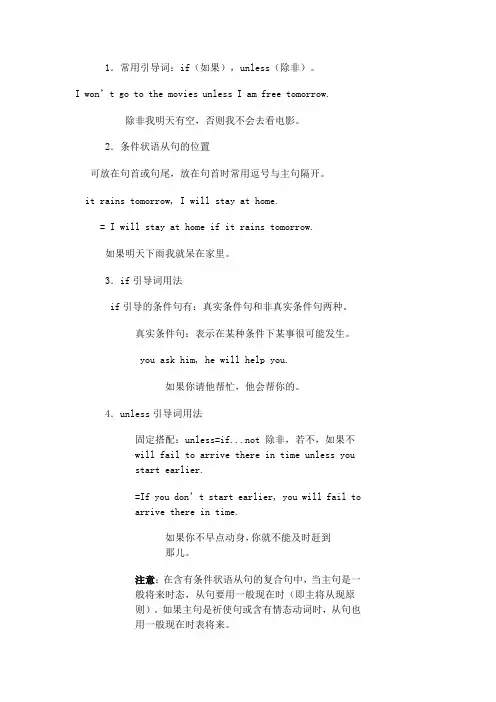
1.常用引导词:if(如果),unless(除非)。
I won’t go to the movies unless I am free tomorrow.除非我明天有空,否则我不会去看电影。
2.条件状语从句的位置可放在句首或句尾,放在句首时常用逗号与主句隔开。
it rains tomorrow, I will stay at home.= I will stay at home if it rains tomorrow.如果明天下雨我就呆在家里。
3.if引导词用法if引导的条件句有:真实条件句和非真实条件句两种。
真实条件句:表示在某种条件下某事很可能发生。
you ask him, he will help you.如果你请他帮忙,他会帮你的。
4.unless引导词用法固定搭配:unless=if...not 除非,若不,如果不will fail to arrive there in time unless youstart earlier.=If you don’t start earlier, you will fail toarrive there in time.如果你不早点动身,你就不能及时赶到那儿。
注意:在含有条件状语从句的复合句中,当主句是一般将来时态,从句要用一般现在时(即主将从现原则)。
如果主句是祈使句或含有情态动词时,从句也用一般现在时表将来。
you study hard, you will pass the exam.1. I will send you an e-mail as soon as I ____ A___ in Canada.A. arriveB. arrivedC. am arrivi ngD. will arrive2. If there ____A___ no buying and selling of an imals, there ______ no killing in nature.A. is; will beB. will be; will beC. is; isD. will be; is3. I’m waiting for my , I'll go shopping alone.A. If she comesB. If she won't comeC. If she doesn't come5. You can’t watch TV ___A_____ you finish your homework.A. unlessB. ifC. whileD. asstudents _____A___ have a sports meeting this weekend if it ___.A. won’t; rainsB. will; rainsC. won’t; will rainD. are going to; is go ing to rain9. I don't know if she ____B___ to my birthday party tomorrow. If she ______, I'll be very hap py.A. comes; comesB. will come; comesC. comes; will come10. —When will you come to Daqing? —I wil l call you ___D__I arrive.A. tillB. whileC. as quickly asD. as soon as11. I’ll give it to Jim as soon as I ___C____ him to morrow.A. sawB. will seeC. seeD. have seen。
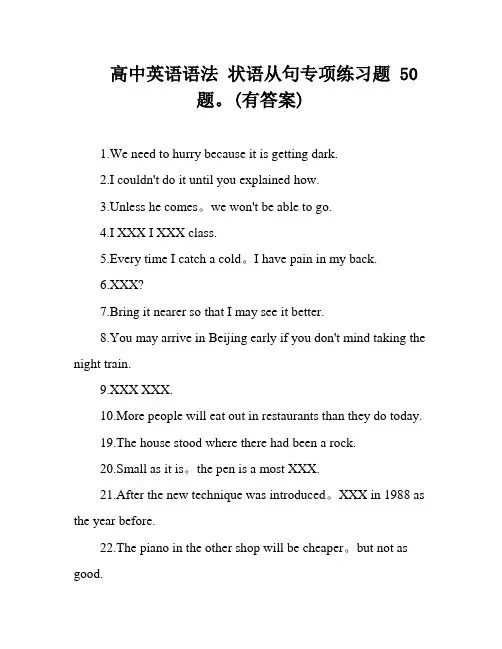
高中英语语法状语从句专项练习题 50题。
(有答案)1.We need to hurry because it is getting dark.2.I couldn't do it until you explained how.3.Unless he comes。
we won't be able to go.4.I XXX I XXX class.5.Every time I catch a cold。
I have pain in my back.6.XXX?7.Bring it nearer so that I may see it better.8.You may arrive in Beijing early if you don't mind taking the night train.9.XXX XXX.10.More people will eat out in restaurants than they do today.19.The house stood where there had been a rock.20.Small as it is。
the pen is a most XXX.21.After the new technique was introduced。
XXX in 1988 as the year before.22.The piano in the other shop will be cheaper。
but not as good.23.John plays football as well as。
if not better than。
David.24.When you read the book。
you'd better make a mark where you have any ns.25.As the day went on。
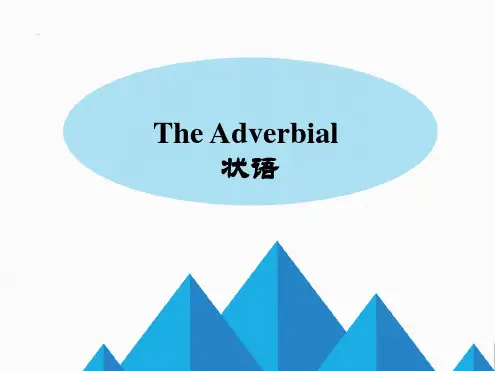
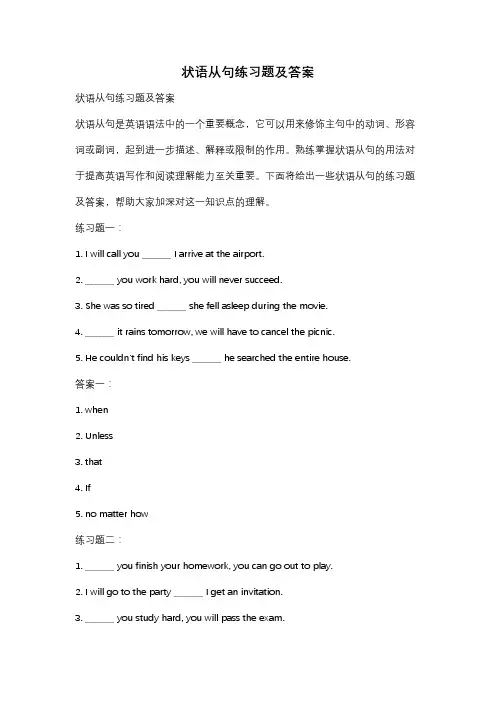
状语从句练习题及答案状语从句练习题及答案状语从句是英语语法中的一个重要概念,它可以用来修饰主句中的动词、形容词或副词,起到进一步描述、解释或限制的作用。
熟练掌握状语从句的用法对于提高英语写作和阅读理解能力至关重要。
下面将给出一些状语从句的练习题及答案,帮助大家加深对这一知识点的理解。
练习题一:1. I will call you _______ I arrive at the airport.2. _______ you work hard, you will never succeed.3. She was so tired _______ she fell asleep during the movie.4. _______ it rains tomorrow, we will have to cancel the picnic.5. He couldn't find his keys _______ he searched the entire house.答案一:1. when2. Unless3. that4. If5. no matter how练习题二:1. _______ you finish your homework, you can go out to play.2. I will go to the party _______ I get an invitation.3. _______ you study hard, you will pass the exam.4. _______ it snows, we will build a snowman.5. She always cries _______ she watches sad movies.答案二:1. Once2. if3. If4. If5. whenever练习题三:1. _______ she is busy, she always finds time to exercise.2. _______ you eat too much, you will gain weight.3. _______ he is tired, he will keep working.4. _______ you don't hurry, you will miss the train.5. _______ she called, I was already asleep.答案三:1. Although2. If3. Even if4. Unless5. When练习题四:1. _______ I go, I always take my camera with me.2. _______ you don't study, you won't pass the test.3. _______ it is cold, I will go for a run.4. _______ she likes him, she never shows it.5. _______ you don't like it, you don't have to eat it.答案四:1. Wherever2. If3. Even if4. Although5. If通过以上练习题,我们可以看到状语从句的用法有很多种,包括时间、条件、原因、方式等等。
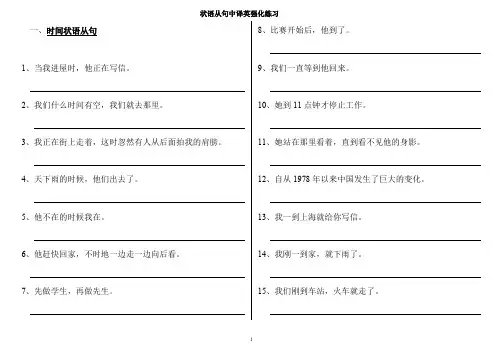
一、时间状语从句1、当我进屋时,他正在写信。
2、我们什么时间有空,我们就去那里。
3、我正在街上走着,这时忽然有人从后面拍我的肩膀。
4、天下雨的时候,他们出去了。
5、他不在的时候我在。
6、他赶快回家,不时地一边走一边向后看。
7、先做学生,再做先生。
8、比赛开始后,他到了。
9、我们一直等到他回来。
10、她到11点钟才停止工作。
11、她站在那里看着,直到看不见他的身影。
12、自从1978年以来中国发生了巨大的变化。
13、我一到上海就给你写信。
14、我刚一到家,就下雨了。
15、我们刚到车站,火车就走了。
16、我们刚开始就被叫停。
17、我每次乘船都晕船。
18、我一听到这首歌,就感到很愉快。
19、下次你来的时候,就会见到他。
二、地点状语从句1、有志者,事竟成。
2、哪里有水,哪里就有生命。
3、你可以随意到你喜欢的任何地方去。
4、无论你去哪都要遵守法律。
三、原因状语从句1、昨天我回来晚了,因为我值班。
2、既然大家都到了,我们开始开会。
3、由于他英语懂得不多,他在字典中查阅这个单词。
4、鉴于天气已经晴朗,我们可以启程了。
5、鉴于他病情严重,我们派人去请医生去了。
四、目的状语从句1、我要把你的电话号码记下来,以免忘记。
2、我把真实情况告诉你,使你能自己作出判断。
3、他们比往常更加努力工作,为了能提前完成工作。
4、多穿点衣服,以免患感冒。
五、结果状语从句1、我们把收音机的音量放大,大家都听到了新闻。
2、他十分激动,以致一句话都说不出来。
3、他说出了这么重要的理由,得到大家的谅解。
4、这是一本十分有意思的书,大家都想看。
六、条件状语从句1、如果我们不怕困难,困难就算不了什么了。
2、除非下雨,我们明天就去那里。
3、只要你努力工作,你就一定能成功。
4、万一我忘了,请提醒我一下。
5、据我所知,那本书下月出版。
七、方式状语从句1、按照我教你的画一只猫。
2、按照人家告诉你做的去做。
3、看上去她好象是生病了。
4、他的行动就好象什么也没有发生。
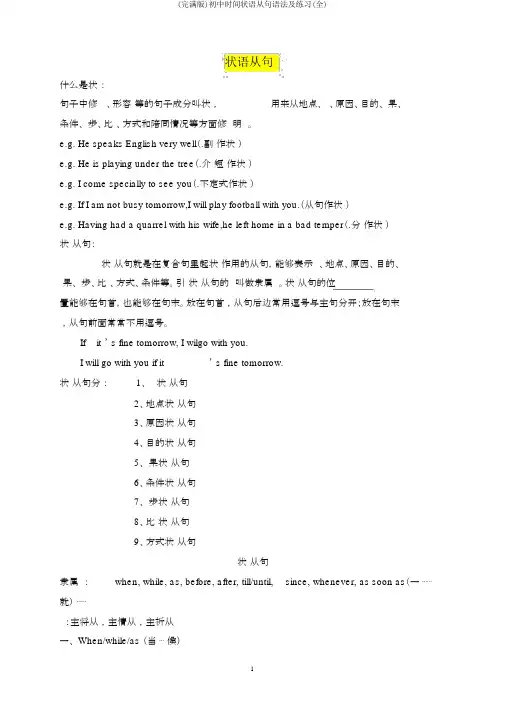
状语从句什么是状:句子中修、形容等的句子成分叫状,用来从地点、、原因、目的、果、条件、步、比、方式和陪同情况等方面修明。
e.g. He speaks English very well(.副作状)e.g. He is playing under the tree(.介短作状)e.g. I come specially to see you(.不定式作状)e.g. If I am not busy tomorrow,I will play football with you.(从句作状)e.g. Having had a quarrel with his wife,he left home in a bad temper(.分作状)状从句:状从句就是在复合句里起状作用的从句,能够表示、地点、原因、目的、果、步、比、方式、条件等。
引状从句的叫做隶属。
状从句的位置能够在句首,也能够在句末。
放在句首,从句后边常用逗号与主句分开;放在句末,从句前面常常不用逗号。
If it ’ s fine tomorrow, I wilgo with you.I will go with you if it’ s fine tomorrow.状从句分:1、状从句2、地点状从句3、原因状从句4、目的状从句5、果状从句6、条件状从句7、步状从句8、比状从句9、方式状从句状从句隶属:when, while, as, before, after, till/until, since, whenever, as soon as(一⋯⋯就)⋯⋯:主将从,主情从,主祈从一、 When/while/as (当⋯候)区:主句作与从句作生的(同/以前 /此后);从句(延性 /瞬性)1)When:when 引状从句表示“当⋯⋯ 的候”,when既能够指段也可指点,从句中既可用延性又可用瞬性,且作既可和主句的作同生又可在主句的作以前或此后生。
且when 引的状从句中一般用一般在表将来(主将从)。
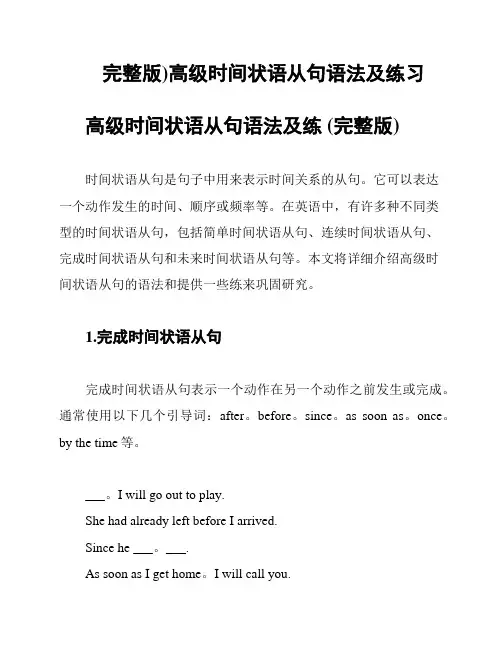
完整版)高级时间状语从句语法及练习高级时间状语从句语法及练 (完整版)时间状语从句是句子中用来表示时间关系的从句。
它可以表达一个动作发生的时间、顺序或频率等。
在英语中,有许多种不同类型的时间状语从句,包括简单时间状语从句、连续时间状语从句、完成时间状语从句和未来时间状语从句等。
本文将详细介绍高级时间状语从句的语法和提供一些练来巩固研究。
1.完成时间状语从句完成时间状语从句表示一个动作在另一个动作之前发生或完成。
通常使用以下几个引导词:after。
before。
since。
as soon as。
once。
by the time等。
___。
I will go out to play.She had already left before I arrived.Since he ___。
___.As soon as I get home。
I will call you.Once you understand the concept。
it es easier.By the time he arrives。
the meeting will have already started.2.未来时间状语从句未来时间状语从句表示一个将来发生的动作或情况。
常用的引导词包括:when。
as soon as。
once。
until。
unless等。
When you come to the party。
please bring a gift.I will call you as soon as ___.Once you finish the project。
you can take a break.I won't go to bed until I finish reading this book.I won't go unless you come with me.3.连续时间状语从句连续时间状语从句表示两个动作或情况在时间上的连续关系。
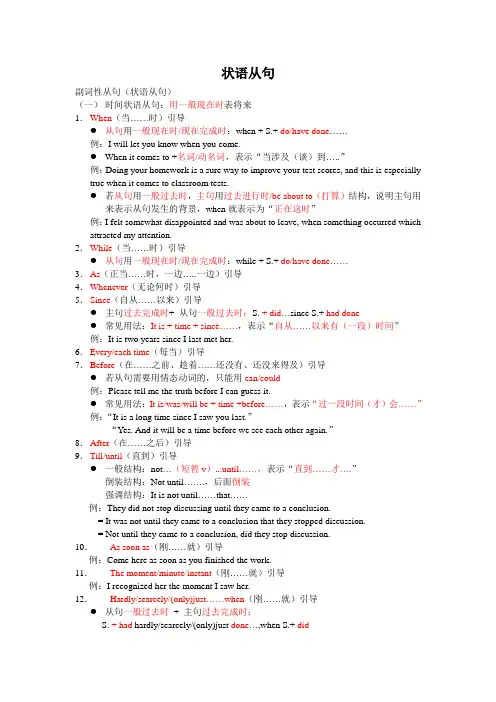
状语从句副词性从句(状语从句)(一)时间状语从句:用一般现在时表将来1.When(当……时)引导●从句用一般现在时/现在完成时:when + S.+ do/have done……例:I will let you know when you come.●When it comes to +名词/动名词,表示“当涉及(谈)到…..”例:Doing your homework is a sure way to improve your test scores, and this is especially true when it comes to classroom tests.●若从句用一般过去时,主句用过去进行时/be about to(打算)结构,说明主句用来表示从句发生的背景,when就表示为“正在这时”例:I felt somewhat disappointed and was about to leave, when something occurred which attracted my attention.2.While(当……时)引导●从句用一般现在时/现在完成时:while + S.+ do/have done……3.As(正当……时,一边…..一边)引导4.Whenever(无论何时)引导5.Since(自从……以来)引导●主句过去完成时+ 从句一般过去时:S. + did…since S.+ had done●常见用法:It is + time + since……,表示“自从……以来有(一段)时间”例:It is two years since I last met her.6.Every/each time(每当)引导7.Before(在……之前、趁着……还没有、还没来得及)引导●若从句需要用情态动词的,只能用can/could例:Please tell me the truth before I can guess it.●常见用法:It is/was/will be + time +before……,表示“过一段时间(才)会……”例:“It is a long time since I saw you last.”“Yes. And it will be a time before we see each other again.”8.After(在……之后)引导9.Till/until(直到)引导●一般结构:not…(短暂v)...until……,表示“直到……才….”倒装结构:Not until…….,后面倒装强调结构:It is not until……that……例:They did not stop discussing until they came to a conclusion.= It was not until they came to a conclusion that they stopped discussion.= Not until they came to a conclusion, did they stop discussion.10.As soon as(刚……就)引导例:Come here as soon as you finished the work.11.The moment/minute/instant(刚……就)引导例:I recognized her the moment I saw her.12.Hardly/scarcely/(only)just……when(刚……就)引导●从句一般过去时+ 主句过去完成时:S. + had hardly/scarcely/(only)just done…,when S.+ did●若hardly/scarcely/(only)just置于句首,主句须倒装(had+ S.+ done)例:He had hardly left school when it began to rain.=Hardly had he left school when it began to rain.13.No sooner……than(刚……就)引导●从句一般过去时+ 主句过去完成时:S. + had no sooner done…, than S.+ did●若no sooner置于句首,主句须倒装(had+ S.+ done)例:We had no sooner reached the top of hill than we all sat down to rest.=No sooner had we reached the top of hill than we all sat down to rest.(二)地点状语从句1.Where(在……地方)引导:从句用一般现在时例:Where there is smoke, there is fire.2.Wherever(无论在哪里)引导例:Wherever he may be, he will be welcome.(三)条件状语从句:用一般现在时表将来1.If(如果、假如)引导:用虚拟语气●if引导得从句中,若有were, had, should三词,可以省略if,并且倒装(谓语置前)例:If I had known about it, I would have told you.= Had I known about it, I would have told you.●If从句+主句= 祈使句/省略句+ and +…….例:If you give me some food, I won’t die of starvation(饥饿).= Some food and I won’t die of starvation;2.Suppose/supposing(假设)引导例:Suppose we cannot get the necessary equipment(设备), what shall we do? 3.Unless(除非、如果不)引导●Unless从句+主句= 祈使句/省略句+ or +…….例:Unless you give me another drink, I will die of thirst.= Another drink or I will die of thirst.4.As/so long as(只要)引导例:We can surely overcome these difficulties so long as we are closely united.5.If only/only if(只要)引导例:We can surely get gains, if only we work hard.6.In case/lest(万一)例:You should take good care of your kid, in case they are ill.7.Provided/Providing/Given that(假如)引导例:We will let you use the room provided that you keep it clean and tidy.8.On condition that(假如)引导(四)原因状语从句1.Because(因为)引导●表示“直接、唯一的原因”,通常放在句后,可以与not, but, only连用例:He was angry not because we were late but because we made a noise.2.As(因为)引导●表示“显而易见或大家都知道的原因”,语气较弱例:Everyone likes you as you are both kind and honest.3.Since(因为、既然)引导●表示“间接或附带的原因”,通常放在句首例:Since she insists, you must come.4.Now/seeing that(既然)引导例:Now/Seeing that you are all here, let’s try and reach a decision.5.Considering that (考虑到)引导例:Considering that he began learning English only a year ago, he speaks very well. 6.In that(由于、因为)引导例:He was late in that he didn’t catch the first bus.(五)让步状语从句1.Though/although/as(虽然)引导●Though/although…..yet连用,表示“虽然…..但是……”例:Though/although we cannot see air, (yet) it exists everyone.●as引导得从句置于句首,且倒装(表语、状语、动词置于as前)表语倒装:可以省略冠词例:Tried as I was, I stayed up late studying last night.Children as he is, he knows a lot of English.状语倒装:Fast as he read, you can’t finish novel in three days.谓语动词倒装:Try as he would, he couldn’t lift the rock.2.Even if/though(即使)引导例:Nobody lost his patience as though the meeting was long and boring. 3.However/no matter how(无论如何/怎样)引导例:We’ll continue to work, no matter how/however hot it is.4.Whatever/no matter what(无论什么)引导例:Whatever/no matter what r you may do, do your best.5.Whoever/no matter who(无论谁)引导例:Whoever/no matter who all cannot break the rules, we must keep the law. 6.Whether……or/no matter whether…..or….(不管……还是)引导例:Whether/no matter whether you can do or cannot do, you must try it. 7.Whether or not/whether……or not(不管是否……)引导例:Whether or not we had a baby, we couldn’t survive only on my salary.= Whether we had a baby or not, we couldn’t survive only my salary.(六)方式状语从句1.As(如,按照)引导例:When in Roma do as the Romans do.2.Just as(正如)引导例:Most plants need air just as they need water.3.As if/though(好像,仿佛)引导●引导的从句常用虚拟语气,除了叙述的情况实现的可能性较大例:He speaks English as if/though he were an Englishman.例:It looks as if/though the coming autumn harvest will be even better than the last one. (七)目的状语从句1.So that(以便、为了)引导●从句中谓语部分可以用can/could,may/might例:I will give you my phone number, so that you can call me when you arrive here. 2.In order to(以便、为了)引导●从句中谓语部分只能用may/might例:We should do our utmost最大可能in order that we may be able to overfulfil 超额完成the task.3.For fear that/lest(以免、以防)引导●从句用虚拟语气“should +V.”例:Batteries 电池must be kept in dry place for fear that/lest electricity should leak 渗漏away.4.In case(以免、以防)引导●从句中谓语部分不用虚拟语气例:Better take more clothes in case the weather is cold.(八)结果状语从1.that(因而)引导例:What’s the matter that they still haven’t answered our e-mail?2.so that(因而)引导●主句,+ so that,且从句中谓语部分只能用may/might例:The temperature is increased , so that the volume of the gas can become greater. 3.So…..that(如此……以至)引导●so +形容词/副词+a/an+名词+ that例:It is so hot a day that we cannot sleep.●so置于句首时,需倒装状语例:So fast did he run that I could not keep up with him●so + much/little/few/many + that,而不用such…..that例:She has so little education that she is unable to get a job.4.Such…..that(如此……以至)引导●Such +名词(可数的单数名词)+ that例:It is such a lovely day that everybody is feeling happy and gay.(九)比较状语从句1.Than(比……)引导例:There are more vocabularies in this unit than in that one.2.As……as(如……一样)引导●As +形容词/副词+a/an+名词+ as + 省略句例:He is as clever a boy as his brother.例:This book is nearly as thick as that one(is).3.Not so……as(不如……一样)引导●As +形容词/副词+a/an+名词+ as + 省略句例:You are not as tall as she.4.The+比较级,the+比较级(越……越…….)引导例:The hotter that air becomes, the lighter it gets.例题1、()______ your daughter has not come back , let me take you to the Friendship Hospital.A WhenB SinceC ThatD For2、()______ Tom is not feeling well today , he has to stay at home.A ThoughB ForC FindingD As3、()They are ______ hard-working students that they have already made ______ much progress since thay came here.A so ; soB such ; suchC so ; suchD such ; so4、()______ we have finished the book we shall start doing some exercises.A For nowB Since nowC Now thatD Since now5、()He asked us not to be noisy ______ we should wake the baby.A in cseB in the caseC in case ofD in this case巩固练习1、()______ you are familiar with the auther`s ideas , by reading all the sections as quickly as you can.A Ever sinceB As long asC So thatD Now that2、()The boy has to learn ______ things that he hardly has time for play.A so manyB such manyC so fewD such few3、()In the old days the poor worker worked long hours every day ______ he could support his whole family.A becauseB thoughC unlessD so that4、()Tell him that I will call him back , ______ he gives me a call.A in most casesB in caseC in any caseD in case of5、()______ you have reminded me , I will try to be a teacher.A Now thenB So thatC Now thatD In order that6、()You will have to study for many years ______ you may become a brain surgeon.A in order thatB in thatC althoughD soKey 1~5 BDDCA 1~6 DADBCA二、习题1、()It is almost impossible to become skilful in speaking a language ______ you use it constantly.A but forB if onlyC exceptD unless2、()Everything will be all right ______ Tom is left to do the work in his own way.A as far asB mean whileC so long asD in case3、()Do remind me of the date again tomorrow ______ I forget.A in caseB except thatC even ifD as though4、()You must do the experiment ______ the teacher told you.A asB sinceC so thatD unless5、()I could not resist having another piece of cake even ______ I was supposed to lose weight.A althoughB howeverC otherwiseD though6、()______ I suggest , he always disagree.A WhatB HowC WhateverD How a7、()However ______ you hate them , you must work with them.A very muchB too muchC much tooD much8、()Try ______ he might , Tom could not get out of the trouble.A as ifB altoughC ifD as9、()______ whales are very large , they are no longer an even match for man.A SinceB BecauseC Now thatD Although10、()Man must have food just ______ plants must have sunlight.A forB likeC becauseD as巩固练习1、()______ I know , the visitors are all satisfied with the arrangement in the next few days.A As far asB As long asC As well asD As soon as2、()______ convincing an argument is , it needs support of evidence.A No matterB ThoughC HoweverD As3、()Anyone can borrow books from the library ______ he has a library card.A so long asB sinceC even thoughD unless4、()______ much advice I gave him , he did exactly what he wanted to do.A HowB WhateverC WhatD No matter how5、()Remember , science requires your whole life ______ you had two lives to give , they would not be enough.A AlthoughB ThoughC If onlyD Even if6、()I am sure that Laura`s latest play , ______ staged , will prove a great success.A sinceB unlessC onceD until7、()Send us a message , ______ you have any difficulty.A in case thatB in caseC whileD as8、()Electricity flows through a wire ______ water flows through a pipe.A whileB just asC much asD whenever9、()Food shortage will long be a world problem ______ much has been done to supply enough for everyone.A althoughB evenC no matterD since10、()I do not like the city , ______ though I have been living here for more than ten years.A evenB asC everD butkey1~5 DCAAD 6~10 CDDDD 1~5 ACADD 6~10 CBBAA。
一、选择题1.This my sister and those my brothers.A.is, is B.are, are C.is, are C解析:C【解析】【分析】【详解】句意:这是我姐姐,那些是我哥哥。
考查系动词辨析。
this这个,单指代词,系词需用is;those那些,复指代词,系词需用are;根据句意结构,故选C。
2.Here ______ a pair of ______. You can use them.A.are; scissors B.is; scissors C.are; scissors D.is; scissor B解析:B【解析】【详解】句意:这儿有一把剪刀。
你可以使用。
考查主谓一致及可数名词复数。
以Here开头的倒装句,主语是空后的“a pair of ___”,系动词的形式与“a pair”保持一致,用第三人称单数形式is;scissors作“剪刀”讲时只以复数形式出现,用a pair of scissors表示“一把剪刀”。
故选B。
3.______ Lucy ______ her mother know my address.A.Not; but B.Both; and C.Either; or D.Not only; but also B 解析:B【解析】【详解】句意:Lucy和她的妈妈都知道我的地址。
考查连词辨析。
Not … but … 不是……而是……;Both … and … ……和……都;Either … or … 要么……要么……;Not only … but also … 不仅……而且……。
Either … or …连接两个主语时,谓语动词用第三人称单数形式,排除C;Not … but …和Not only … but also连接两个主语时,谓语动词就近一致原则,her mother是第三人称单数,题干中know是动词原形,不符合这两个短语的用法,排除AD;只有Both … and …连接两个主语时谓语动词可用原形。
一、单项选择:1. It just isn’t fair________I was working as a waiter last month,my friends were lying on the beach.A.whenever B.Though C.for D.while【解析】本题句意为:这真不公平。
上个月当我在做服务员的时候,我的朋友们正躺在沙滩上。
表示“与此同时”用while,引导时间状语从句。
【答案】 D2. —I wonder how much you charge for your service.—The first two are free________the third costs $30.A.while B.Until C.when D.before【解析】考查连词的用法。
根据句意,这里表示前后句之间的对比,所以用while,表示“而”。
语意是“前面两项服务是免费的,而第三项收费30美元”。
【答案】 A3. Because of the heavy traffic, it was already time for lunch break _______ she got to her office.A. sinceB. thatC. whenD. until【答案】 C4. The old man asked Lucy to move to another chair _______ he wanted to sit next to his wife.A. althoughB. unlessC. becauseD. if【答案】 C5. You may use room as you like _______ you clean it up afterwardsA. so far asB. so long asC. in caseD. even if【答案】 B6. Mary made coffee ________ her guests were finishing their meal.A. so that B although C. while D. as if【答案】 C7. The little boy won’t go to sleep _____ his mother tells him a story.A. orB. unlessC. butD. whether【答案】 B8. She had just finished her homework________her mother asked her to practise playing the piano yesterday.A.when B.While C.after D.since【解析】句意为:昨天她刚做完作业,她妈妈就让她练钢琴。
状语从句(adverbial clause)复习要点:掌握句法功能,记住连接词语法意义:状语从句是复合句中的一种,整个从句作主句的状语,修饰主句中的谓语动词、形容词、或副词。
置于句首时,状语从句后面一般要有逗号隔开;如果状语从句置于句尾,则从句一般不用逗号。
按照所作的状语和意义可分为时间、地点、原因、目的、结果、条件、让步、方式和比较等九种状语从句。
具体如下:一、时间状语从句(Adverbial Clauses of Time)时间状语从句通常由when,whenever,as,while,before,after,assoon as,since,once,no sooner...then,hardly/scarcely...when,tiLl/until 以及the moment,directly,immediately,the second,thefirst time,next time,every time,等引导。
1.由when,as,while 引导的状语从句:1)when 引导时间状语从句,表示当···,其谓语动词可以是延续性的,也可以是非延续性的,其作用最广泛。
When spring comes,trees turn green,When it rains,I usually go to work by taxi.When we were having lunch,the light went out.I will ring you up when I return.When she pressed the button,the lift stopped.He was eating his breakfast when the doorbell rang.be about to do...when...“就在那/这时,(突然)另一个动作发生了,在这儿只能用when。
2021年初中英语语法:时间状语从句解析和练习题(含答案)在句子中起时间状语作用的句子称为时间状语从句。
时间状语从句可以放在句首、句中和句尾。
引导时间状语从句的词有when、while、as、before、after、since、until/till、as soon as、once、each time、next time、the moment、immediately、instantly等。
(一)when引导的时间状语从句1)when意为“当......时”,引导时间状语从句,表示主句的动作和从句的动作同时或先后发生例句:Faith is the bird that feels the light when the dawn is still dark. 信念是黎明前的黑夜里能感受到光明的鸟儿。
例句:When I was wandering in the street, I met her. 我在街上徘徊的时候遇到了她。
2)when引导的时间状语从句中的动词可以用延续性的=动词,也可以用终止性动词例句:He was listening to the music when I went in. 当我进去的时候,他正在听音乐。
例句:I will visit my parents when I have time. 我有空时会去看望我的父母。
(二)while引导的时间状语从句While引导的时间状语从句,常译为“与......同时,在......期间”,while引导的从句常用延续性动词或表示状态的动词。
例句:They rushed in while we were discussing problems. 当我们正在讨论问题时,他们冲了进来。
例句:Make hay while the sun is shining. (谚)趁热打铁。
(三)as引导的时间状语从句As引导的时间状语从句,可以表达“正当,一边一边,随着”等意思。
语法系列训练及答案——状语从句1. It is ___ he has behaved so badly that he must be punished.A. asB. sinceC. becauseD. that2. Practise as ___ as you can.A. muchB. manyC. moreD. hardly3. ___ I admit that the problems are diff icult, I don’t agree that they cannot be solved.A. SinceB. AsC. Even thoughD. Because4. I will let you drive ___ you have a driving licence.A. unlessB. exceptC. on condition thatD. so that5. Mike acted ___ nothing had happened.A. asB. as thoughC. as althoughD. just like6. Roses need special care _____ they can live through winter.A. becauseB. so thatC. even ifD. as7. The thief ran ____ he was out of sight in a short while.A. so fast thatB. too fast thatC. fast enough thatD. such fast that8. ___ you understand this rule, you will have no further difficulty.A. BeforeB. WhileC. AsD. Once9. Don’t go to the party until ____.A. inviteB. invite toC. invited toD. to invite10.The protection device can help to eliminate the possible faults ______they cause moredamage.A. unlessB. althoughC. untilD. before11. These two areas are similar ____ they both have a high rainfall during this season.A. to thatB. besides thatC. in thatD. except that12. ____ that he is only a beginner, it is understandable for him to make such mistakes.A. ConsideringB. ConsideredC. ConsiderD. To consider13. Although he knew little about the large amount of work done in the field, he succeeded ____ other more well-informed experimenters failed.A. whichB. thatC. whatD. where14. Excuse me. If your call’s not too urgent, do you mind ____ mine first.A. I makeB. if I makeC. me to makeD. that I make15. ____ the calculation is right, scientists can never be sure that they have included all variables and modeled them accurately.A. Even ifB. As far asC. If onlyD. So long as16. Michael used to look hurt and surprised when ____ .A. scoldingB. to scoldC. having scoldedD. scolded17. I was just to go out ____ it began to rain.A. asB. whenC. afterD. whole18. I felt somewhat disappointed and was about to leave ____ something occurred which attracted my attention.A. unlessB. untilC. whenD. while19. No sooner had we reached the top of the hill ____ we all sat down to rest.A. whenB. thenC. thanD. until20. I have kept that portrait ____ I can see it every day, as it always reminds me of my universitydays in London.A. whichB. whereC. whetherD. when21. Richard is ____ boy that everyone in the class likes him.A. a so brightB. so a brightC. such bright aD. so bright a22. We’ll wait here ____ you get back.A. soon afterB. untilC. as soon asD. when23. Important ____ his discovery was, it was regarded as a matter of no account in his time.A. forB. toC. althoughD. as24. Speak to him slowly ____ he may understand better.A. in case thatB. so thatC. because thatD. least25. The harder you study, ____ you will serve the people.A. the betterB. betterC. the bestD. the better that26. Mr. Smith is _____ a good teacher _____ we all respect.A. such…thatB. such… asC. so…thatD. so…as27. Our profits will be good _____ the dollar remains strong.A. ifB. althoughC. unlessD. as long as28. _____ is mentioned above, there are more and more trade between China and America.A. WhichB. AsC. ThatD. What29.he took a wrong bus , ______he was a full hour late on the first day he went to work .A. On condition thatB. whichC. so thatD. on the ground that30. Emily had failed many times; _____, she was confident she would succeed in the end.A. neverthelessB. althoughC. thereforeD. otherwise31. Neither of them allowed the donors of the portrait to see _____ they both disliked it.A. howB. how muchC. how oftenD. how soon32. We are aware that, _____, the situation will get worse.A. if not dealing with carefullyB. if dealt not carefully withC. if not carefully dealt withD. if not carefully dealing with33. He remained in this company, not _____ he liked the company, but that he liked the teammates he had.A. forB. sinceC. asD. that34. They looked at the national flag, _____.A. tears appeared in their eyesB. tears appearing in their eyesC. and tears appearing in their eyesD. when tears appearing in their eyes35. The question was _____ to take the children to the zoo or to leave them at home.A. howB. howeverC. ifD. whether36. I hurried _____ I wouldn’t be late for class.A. becauseB. so thatC. as ifD. unless37. We won’t give up _____ we should fail ten times.A. even ifB. sinceC. whetherD. until38. _____ ,he had no intention of waiting for three hours.A. Patient although he wasB. As he was patientC. Patient as he wasD. Since he was patient39. _____ that the whole roof was blown off.A. So was terrible the stormB. So was terribly the stormC. So terrible was the stormD. So terribly was the storm40. Ships carry lifeboats _____ the crew can escape _____ the ship sinks.A. so as to… ifB. so that…unlessC. so that…ifD. in order that…in case that41. He hid the fragments of the vase in the drawer ______his mother should discover them .A. afraid ofB. in thatC. in caseD. so that42. Earthworms occur ______adequate moisture and food and the necessary soil conditions arefound.A. howeverB. andC. whereverD. but43. The old man slipped on the stairs and fell down , ______breaking his left leg.A. soB. thusC. thereforeD. hence44. Someone called me up in the middle of the night, but they hung up _____ I could answer the phone.A. asB. sinceC. untilD. before45. What has happened ______all the audience look so excited?A. thusB. in order thatC. so as toD. that46. The men will have to wait all day _____ the doctor works faster.A. ifB. unlessC. whetherD. that47. Hundreds of jobs _____ if the factory closes.A. loseB. will be lostC. are lostD. will lose48. —Did you remember to give Mary the money you owed her?—Yes. I gave it to her _____ I saw her.A. whileB. the momentC. suddenlyD. once49. He is eating like a horse ______he hadn’t had a decent meal for a month.A. sinceB. as ifC. asD. like50. He will have learned English for eight years by the time he _____ from the university nextyear.A. will graduateB. will have graduatedC. graduatesD. is to graduate1. C2. A3. C4. C5. B6. B7. A8. D9. C 10. D 11. C 12. A 13. D 14. B 15. A 16. C 17. B 18. C 19. C 20. B 21. D 22. B 23. D 24. B 25. A 26. B 27. D 28. B 29. C 30. A 31. B 32. C 33. D 34. B 35. D 36. A 37. A 38. C 39. C 40. C 41. C 42. C 43. B 44. D 45. D 46. B 47. B 48. B 49. B 50. C。
1. Tim is in good shape physically he doesn't get much exercise.A. ifB. even thoughC. unlessD. as long as2. The school rules state that no child shall be allowed out of the school during theday, ______accompanied by an adult.A. onceB. whenC. ifD. unless3.you may have, you should gather your courage to face the challenge.A. However a serious problemB. What a serious problemC. However serious a problemD. What serious a problem4.Because of the heavy traffic,it was already time for lunch break she got to heroffice.A.since B.that C.when D.untilJohn thinks it won’t be long he is ready for his new job.A. whenB. afterC. beforeD. since6. Today, we will begin ________we stopped yesterday so that no point will be left out.A. whenB. whereC. howD. what7. She had just finished her homework her mother asked her to practice playing the piano yesterday.A. whenB. whileC. afterD. since8. My parents don’t mind what job I do I am happy.A. even thoughB. as soon asC. as long asD. as though9. You can’t borrow books from the school library ______ you get your student card.A. beforeB. ifC. whileD. as10. All the dishes in this menu, otherwise stated, will serve two to three people.A. asB. ifC. thoughD. unless11.Because of the financial crisis, days are gone _ _ local 5-star hotels charged 6,000 yuan for one night.A. ifB. whenC. whichD. since12. __ unemployment and crime are high, it can be assumed that the latter is due to the former.A. BeforeB. WhereC. UnlessD. Until13.—Did you return Fred’s call?—I didn’t need to ____I’ll see him tomorrow.A. thoughB. unlessC. whenD. because14.I’m sorry you’ve been waiting so long,but it’ll still be some time ____Brian gets back.A. beforeB. sinceC. tillD. after15.We’ll have a picnic in the park this Su nday _____ it rains or it’s very cold.A.sinceB. ifC. unlessD. until16.in the fields on a March afternoon,he could feel the warmth of spring. A.To walk B.Walking C.Walked D.Having walked17.Nancy enjoyed herself so much she visited her friends in Sydney last year.A.thatB.whichC.whenD.where18.You’d better not leave the medicine kids can get at it.A.even ifB.whichC.whereD.so that19. I won’t call you,something unexpected happens.A.unlessB.whetherC.becauseD.while—I brought it to you you were in Mr. Black’s office yesterday.A.ifB.whenC.becauseD.before21.Most brids find it safe to sleep in the trees,but they have eggs or young chicks,theydon’t use a nest.A.whyB.howC.unlessD.where22.—when has the country been open to international trade?—1978,I suppose.A.SinceB.InC.FromD.After23.My parents live in a small village.They always keep candles in the house there is a power out.A.ifB.unlessC.in caseD.so that24.Many of them turned a deaf ear to his advice,they knew it to be valuable.A.as ifB.now thatC.even thoughD.so that25.I really don’t like art,I find his work impressive.A.AsB.SinceC.IfD.While26.you’ve tried it,you can’t imagine how pleasant it is.A.UnlessB.BecauseC.AlthoughD.When27.If you are traveling the customs are really foreign to your own,please do as the Romans do.A.in whichB.whatC.whenD.where28.In time of serious accidents,we know some basic things about first aid,we can save lives.A.whetherB.untilC.ifD.unless29.How can you expect to learn anything you never listen?A.in caseB.even ifC.unlessD.when30.In peace,too,the Red Cross is expected to send help there is human suffering.A.whoeverB.howeverC.whateverD.wherever1.After living in Paris for fifty years he returned to the small town __________ he grew up as a child. (NMET 1996)A.WhichB.ThatC.WhereD.when2.Carol said the work would be done by October, __________ personally I doubt very much. (NMET 1999)A.ItB.ThatC.WhenD.which3.Dorothy was always speaking highly of her role in the play, __________, of course, made the others unhappy. (NMET 2000)A.WhoB.WhichC.ThisD.what4.__________ is known to everybody, the moon travels round the earth once every month. (NMET 2001)A.ItB.AsC.ThatD.What5.The film brought the hours back to me __________ I was taken good care of in that far-a way village. (NMET2001)6.__________ is mentioned above, the number of the students in senior school is increasing. (1994上海卷)A.WhichB.AsC.ThatD.It7.In the office I never seem to have time until after 5:30 p.m., __________ many people ha ve got home. (1995上海卷)A.whose timeB.ThatC.on whichD.by which8.All of the flowers now raised here have developed from those __________ in the forest. (1997上海卷)A.once they grewB.they grew onceC.they once grewD.once grew9.He made another wonderful discovery, __________ of great importance to science. (1998上海卷)A.which I think isB.which I think it isC.which I think itD.I think is10.He was very rude to the Customs officer, __________ of course made things even worse. (1999上海卷)A.whoB.WhomC.whatD.which11.Recently I bought an ancient Chinese vase, __________ was very reasonable. (2000上海卷)A.which priceB.the price of whichC.its priceD.the price of whose12.He’s got himself into a dangerous situation __________ he is likely to lose control over t he plane. (2001上海卷)A.WhereB.WhichC.whileD.why13.I can think of many cases __________ students obviously knew a lot of English words a nd expressions but couldn’t write a good essay. (2003上海卷)A.WhyB.WhichC.AsD.where14.The gentleman __________ you told me yesterday proved to be a thief. (2000上海春)A.WhoB.about whomC.whomD.with whom15.It was an exciting moment for these football fans this year, __________ for the first time in years their team won the World Cup. (2000北京春)A.ThatB.WhileC.WhichD.when16.The result of the experiment was very good, __________ we hadn’t expect. (2000北京春)A.WhenB.ThatC.WhichD.what17.Have you seen the film Titanic, __________ leading actor is world famous? (2001上海春)A.ItsB.it’sC.whoseD.which18.John said he’d been working in the office for an hour, __________ was true. (2001北京春)19.Is this the reason __________ at the meeting for his carelessness in his work? (2002上海春)A.he explainedB.what he explainedC.how he explainedD.why he explained20.The famous basketballer, __________ tried to make a comeback, attracted a lot of attentio n. (2002北京春)A.WhereB.WhenC.WhichD.who21.We are living in an age __________ many things are done on computer. (2003北京春)A.WhichB.ThatC.WhoseD.when22.We will be shown around the city: schools, museums, and some other places, __________ other visitors seldom go. (2002北京)A.whatB.WhichC.WhereD.when23.York, __________ last year, is a nice old city. (2003北京)A.that I visitedB.which I visitedC.where I visitedD.in which I visited24.Luckily, we'd brought a road map without __________ we would have lost our way. (200 4北京春)A.itB. ThatC.thisD.which25.The journey around the world took the old sailor nine months, __________ the sailing ti me was 226 days. (2004广西卷)A.of whichB.during whichC.from whichD.for which26.The factory produces half a million pairs of shoes every year, 80% __________are sold a broad. (2004辽宁卷)A.of whichB.which ofC.of themD.of that27.There are two buildings, __________stands nearly a hundred feet high. (2004湖北卷)A.the largerB.the larger of themC.the larger one thatD.the larger of which28.The English play __________ my students acted at the New Year’s party was a great suc cess. (2004全国卷)A.for whichB.at whichC.in whichD.on which1答案:B解析:句意:“尽管Tim不经常锻炼,但他身材很好。
~状语从句(高考)1.时间状语从句常用引导词when,as,while,as soon as,before,after,since,till ,until特殊引导词every time/each time每次, immediately /the moment一---就---,when it comes to---说到---等,the first /last time第一次1)I will tell him when he comes back.他回来时我就告诉他。
2)I will tell him as soon as he comes back.他一回来我就把这个消息告诉他。
= I will tell him the moment he comes back.= I will tell him immediately he comes back./Be careful ! The machine starts moment you press___(你一按)the button.(moment)3)Each time I meet him, he will say Hello to me.每次我见到他,他都会向我问好。
Every time I listen to your advice,I get into trouble.每次我听你的意见,我都会陷入困境。
4)while引导的时间状从,从句中必须是延续性动词While he was reading ,his wife was cooking.他看书时,他妻子烧饭。
5)till(一般不放在句首)until肯定形式表示“做某事直到某时”,动词必须是延续动词。
否定形式表示“直至某时才做某事”动词一般为非延续性动词I slept until midnight.=I didn`t wake up until midnight.我一直睡到半夜时醒了。
Wait till I call you.=Don`t leave till I call you.等着我叫你。
}Don`t get off the bus until it has stopped.公共汽车停稳了再下车。
She didn`t arrive until 8 o`clock.她直到8点才到。
=She arrived not until 8 o`clock.= Not until 8 o`clock did she arrive.=It was not until 8 o`clock that she arrived.6)since从句,自从---以来She has never called on me,since she moved to the country.自从她搬到乡下以来就未来看过我。
It is /has been two years since we began to use the machine .我们使用这部机器已经有两年了。
= We began to use the machine two years ago.=We have used the machine for two years.注意:(1)It is/has been+一段时间+since引导的时间状语从句(自从做某事已经有多长时间了)It is /has been a long time since we got married.自从我们结婚以来已经有很长时间了。
=We have been married for a long time.=We got married a long time ago.注意:(2)It will be/was+一段时间+before从句(多久之后才…… before 引导时间状语从句)。
—It will (not )be a long time before he comes back.他很久以后/不久就会回来。
It was three years before he came back.三年以后她回来了。
=He came back after three years.It will be three years before he comes back.三年以后他才会回来。
=He will come back in three years.7)When it comes to tennis,you can`t beat her.说到网球,你是赢不了她的。
8)The first time I saw him ,he is still a child.我第一次见到他时,他还是个孩子。
9)be doing—when—正在—突然—had( just) done—when—刚刚---突然---be about to do—when—正要干—突然—{We were having dinner when someone knocked at the door.I had just gone to bed,when the telephone rang.我刚上床电话铃响了。
I was about to go out when it began to rain.我刚要出门天开始下雨了。
10.as随着---As time went by/passed,her hair grew gray.随着时间的流逝她的头发变得花白了。
=With time going by/passing, her hair grew gray.2.地点状语从句,常用引导词whereGenerally,air will be polluted where there are factories.一般来说,有工厂的地方空气就会受到污染。
注意:where 不能换成in whichHe lives where I used to work.他住在我原来工作的地方。
3.^4.原因状语从句,常用引导词because与why对应,since既然/由于,常放在句首,as常表示众所周知的原因,for不是说明直接原因而是加以推断Since/Now that everyone is here,let`s begin.既然每个人都到了我们就开始吧。
特别引导词now that=since既然,一般放在句首As the weather is so bad ,we have to delay our journey.由于天气那么差我们不得不推迟旅行。
He is absent today,because he is ill.他今天没来因为他病了。
He must be ill, for he is absent.他肯定是病了因为他没来。
5.目的状语从句,常用引导词so that,in order that特别引导词in case以防for the purpose that为了…The boss asked the secretary to hurry up with the letters so that/in order that/ for the purpose that he could sign them.老板要秘书快点处理信件以便他能签字。
Take a taxt in case you are late for the meeting.坐出租车去免得开会迟到。
6.结果状语从句,常用引导词so+形容词或副词+that---,such+名词+that---如此的---以至于---,但so many/much/few/little(少)+名词+that---,such a+形容词+名词(可数名词单数)+that---=so +形容词+a+名词(可数名词单数)He got up so early that he caught the first bus.他起的那么早以至于赶上了头班车。
It is such good weather that we all want to go out playing.这么好的天气我们都想出去玩。
There are so many people in the street that we can`t walk fast.街上有那么多人以至于我们走不快。
He is such a young boy that he can`t go to school.他是那么小的男孩不能上学。
= He is so young a boy that he can`t go to school.=The boy is so young that he can`t go to school.= The boy is too young to go to school.= The boy is not old enough to go to school.7.条件状语从句,常用引导词if, unless除非(特别引导词as/so long as只要on condition that 条件是Let`s go out for a walk unless you are too tired.=If you are not too tired,let`s go out for a walk.你如果不太累让我们出去散会儿步。
You will certainly succeed so/as long as you keep on trying.只要你坚持努力一定会成功。
I will lend you the bike on condition that you must keep it clean.我把自行车借给你条件是你一定要保持它干净。
7.让步状语从句,常用引导词though/although虽然,even though/even if即使特别引导词as(虽然)用在让步从句中必须倒装,提到句首的名词前不能有冠词while(虽然),no matter---,wherever,whenever 等Although/though it`s raining,they are still working in the field.虽然天下雨,但他们仍在地里干活。
=It is raining,but they are still working in the field.The old man always enjoys swimming even if/even though the weather is rough.即使天不好那位老人总是喜欢游泳。
"Much as I respect him ,I can`t agree to his proposal.虽然我很尊敬他,我不能同意他的建议。